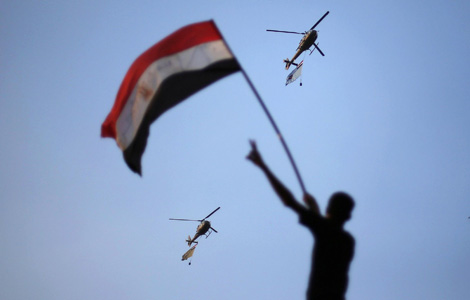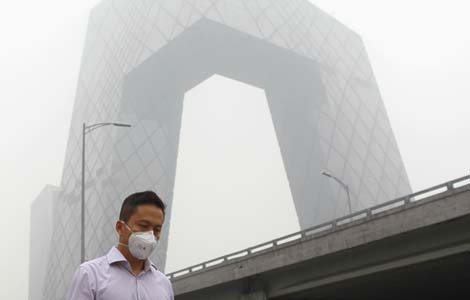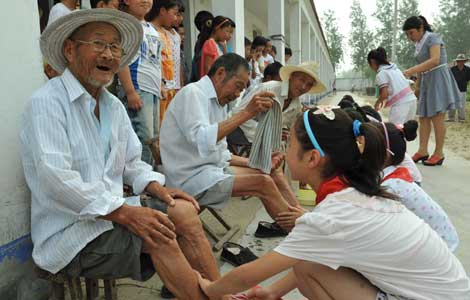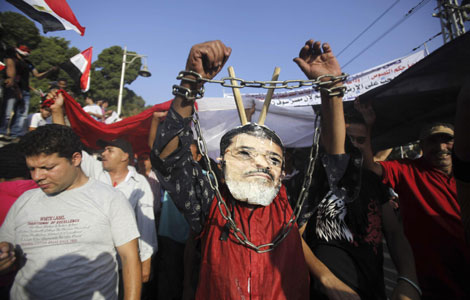Afghan security lies in development
Updated: 2013-07-02 08:40
By Ajay Chhibber (China Daily)
|
||||||||
In the past, significant emphasis was placed on providing inputs such as irrigation, fertilizer and seeds. Not enough focus has been given to understanding the supply chain, encouraging agro-processing and finding markets for agricultural products.
Much attention has turned to Afghanistan's mining potential. Afghanistan's efforts to develop a mining law and an investment framework have been progressing, but developing mining takes time and huge investments will take place only when peace is established.
Afghanistan could also consider a cash-for-work scheme focused on road maintenance, reforestation and basic urban and municipal infrastructure. Schemes for the youth, focused on skills training, sports and civic culture are also crucial.
Kabul is the fastest growing city in the world as refugees return from abroad and people migrate from the countryside to the capital. Given the lack of well-established property rights and insufficient services, there remains a large, vulnerable population that shuffles around the city, creating a huge challenge for the government and a sense of insecurity. Without jobs no security is possible.
Challenge four: Heavy emphasis has been laid on building and strengthening Afghanistan's security forces but not enough attention has been paid to justice and the rule of law. This leaves a vacuum - especially in remote areas.
The Taliban have gained acceptability in some parts of the country by providing a sort of rough and ready justice. If people are to reject the Taliban, they must experience an alternative that is credible, predictable and fair under the rule of law.
The Law and Order Trust Fund managed by the United Nations Development Programme must be used not just to restore order, but also to build infrastructure for the provision of law.
Challenge five: A visible and vital symbol of a credible transition will be the 2014 presidential elections, and subsequent parliamentary and local elections. People will want to see an electoral system that can deliver a reasonably clean election and withstand the tests it will face. Women's ability to vote and play an equal part in politics will be carefully watched.
The UN is working closely with the Independent Election Commission to develop such a system - but as the political maneuverings intensify with the elections getting closer, a united international community must be prepared to provide financial assistance and ensure that the key players honor their commitments for a free and fair election.
A landlocked country, Afghanistan has prospered when it acted as a bridge across regions - with China and Central Asia to the North and East, with India and Pakistan to the South and with the Near East to its West. Therefore, regional cooperation must form a core of any strategy of economic development for Afghanistan.
With the prospects of improved India-Pakistan relations any trade agreement between them would be a huge boon for Afghanistan, because it would pave the way to the large and growing Indian market. It would also open up the possibility of the much-discussed TAPI (Turkmenistan-Afghanistan- Pakistan-India) energy corridor. Likewise, entry into Central Asia and China, along the Silk Road, offers Afghanistan huge trade potential.
If these challenges are overcome, we can see more progress in economic and social development, and a better framework for security too.
The author is UN assistant secretary-general, UNDP assistant administrator, and director of UNDP's Regional Bureau for Asia and the Pacific.

 Egypt army gives Mursi 48 hours to share power
Egypt army gives Mursi 48 hours to share power
 Yao among Rockets big names to attract Howard to Houston
Yao among Rockets big names to attract Howard to Houston
 No quick end in sight for Beijing smog
No quick end in sight for Beijing smog
 New filial law sparks debate
New filial law sparks debate
 Bakelants claims Tour de France second stage
Bakelants claims Tour de France second stage
 2013 BET Awards in Los Angeles
2013 BET Awards in Los Angeles
 Gay pride parade around the world
Gay pride parade around the world
 Four dead in Egypt clashes, scores wounded
Four dead in Egypt clashes, scores wounded
Most Viewed
Editor's Picks

|

|

|

|

|

|
Today's Top News
Deadly fire engulfed 19 Arizona firefighters in seconds
Mandela 'still critical but stable'
Snowden threats to make new US leaks
Book reveals islands' true history
Tokyo warned not to resort to 'empty talk'
Snowden applies for Russian asylum
No quick end in sight for Beijing smog
New home prices defy curbs
US Weekly

|

|






